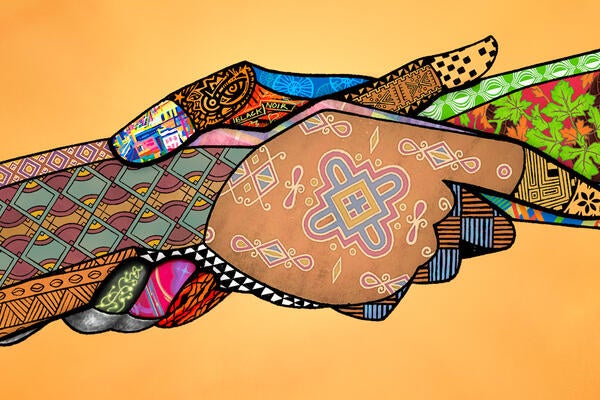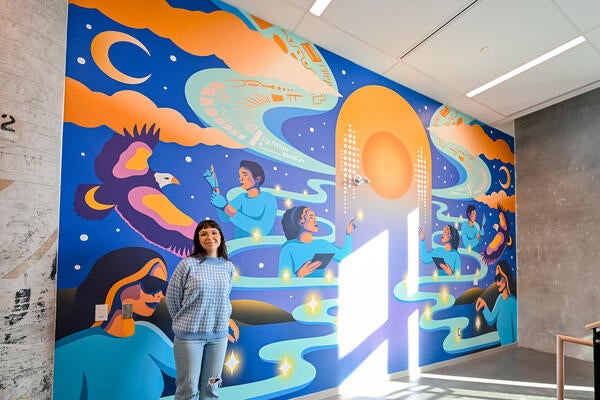
Innovation lab tackles clean energy for developing world
Waterloo researchers work to provide developing regions with access to electricity for improved healthcare, education and prosperity

Waterloo researchers work to provide developing regions with access to electricity for improved healthcare, education and prosperity
By Nigel Moore Waterloo Institute for Sustainable Energy Researchers at innovation lab in Germany.
Researchers at innovation lab in Germany.
Providing affordable renewable energy to more than 1 billion people who do not have access to reliable electricity is increasingly recognized as a major opportunity for meeting global development and climate change goals.
Small-scale solar and other renewable energy technologies are beginning to gain a foothold in sub-Saharan Africa, developing Asia and other energy poor regions of the world where their provision can lead to better outcomes in areas such as health, education, agriculture, economic opportunity and poverty eradication. Meeting this challenge requires innovation in everything from technology to business models and government policies.
For this reason, the Waterloo Institute for Sustainable Energy (WISE) has joined together with a consortium of leading researchers and institutions to create the Affordable Energy for Humanity (AE4H) initiative. AE4H is working to bring academic, private and public sector experts together to accelerate innovation in this growing development sector.
Recently, WISE, together with partners at the Waterloo Global Science Initiative, Karlsruhe Institute of Technology and Institute for Advanced Sustainability Studies, hosted an “innovation lab” in
Germany to scope new research areas for global energy access. The event featured working sessions on a diverse set of themes from policy to technology and capacity-building. It brought together 53 innovators from 31 institutions in 16 countries, including six Waterloo researchers and staff members and two Waterloo-based entrepreneurs who have worked with Velocity to develop new energy access ventures.
Speakers at the innovation lab discussed how data gathering, sharing and interpretation is one way that private, public and academic sectors can collaboratively support decision-making to more quickly bring energy to developing regions. According to Bissan Ghaddar, a professor in Waterloo Engineering’s Department of Management Sciences, “The availability of open and standardized data coupled with analytics will be a game-changer when it comes to achieving accessible, affordable and sustainable energy for all.”
Velocity startup founder Uche Onuora, whose company HITCH is innovating off-grid Internet routers for the African market said, “I came in believing that energy access was an add-on value to our target end-users. I left understanding that energy access is the platform that HITCH rides on to deliver its value. And like all platform technologies, the key to unlocking our full value lies in the relative data it aggregates, mines, and analyzes.”
Entrepreneurs will also be key to opening up energy access in remote regions. To support them, incubators and business accelerators like Velocity and Communitech here in the Waterloo Region should be replicated in regions facing energy poverty. Institutions like Waterloo may therefore have an important role to play in helping to establish and nurture such efforts throughout the developing world.
Since it was launched in late 2015, AE4H has collaborated with the Waterloo Global Science Initiative on their most recent summit and helped to develop the OpenAccess Energy Blueprint—a report that outlines a pathway to growing the global energy access sector through specific actions in the areas of policy, finance, entrepreneurship support and local capacity building. The AE4H consortium is now comprised of over 130 researchers and practitioners from 50 institutions in 20 countries.

Read more
A message from the President and Vice-Chancellor

Read more
Sport and Recreation Management student Diane Choi embarks on co-op term with the Canadian Olympic Committee

Read more
Many Hearts, One Mind by Indigenous artist Alanah Jewell celebrates the act of creation shared by the Land and innovators in our community
The University of Waterloo acknowledges that much of our work takes place on the traditional territory of the Neutral, Anishinaabeg, and Haudenosaunee peoples. Our main campus is situated on the Haldimand Tract, the land granted to the Six Nations that includes six miles on each side of the Grand River. Our active work toward reconciliation takes place across our campuses through research, learning, teaching, and community building, and is co-ordinated within the Office of Indigenous Relations.